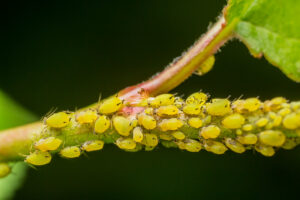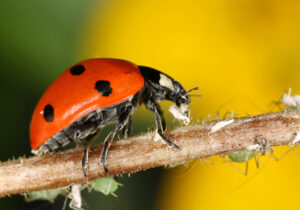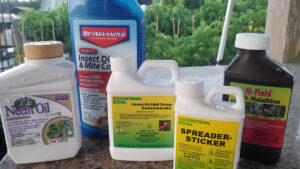By: Anna Stubbendick, FCHP
If you’ve noticed small, soft-bodied insects on your plants that seem to multiply quickly, chances are you have aphids. These tiny pests can cause significant damage to plants and gardens, but with the right knowledge and tools, you can control them effectively.
Identifying Aphids

Aphids will tend to cluster at the along the veins and at the bases of the leaves and flower buds of plants. ©Photo by Adobe Stock
Aphids are small, pear-shaped insects that come in a variety of colors, including green, black, brown, and pink. They feed on the sap of plants by piercing the leaves and stems, which can cause the plant to wilt, yellow, or even die. You may also notice sticky, shiny substance on leaves which is an aphid excrement called honeydew. The honeydew on the leaves is the most common cause of the black sooty mold, which is often the first thing that you may notice on your plants, even before the detection of the insects themselves.
Controlling Aphids
There are several ways to control aphids, including natural methods and chemical solutions. One natural method is to introduce natural predators like ladybugs, lacewings, and parasitic wasps to your garden. You can also use insecticidal soaps and oils, which are made from natural ingredients and are effective at controlling aphids.

Ladybugs are an excellent natural means of controlling aphid infestations. ©Photo by Adobe Stock
Another effective method is to spray plants with a strong stream of water, which will knock off the aphids and prevent them from returning. In some cases, pruning heavily infested plant parts can also help control aphids. However, for severe infestations, a chemical solution may be necessary. It’s important to note that while chemical pesticides can be effective at controlling aphids, they can also harm beneficial insects and their larvae like caterpillars, bees, butterflies, and other pollinators. To help protect pollinators, we recommend using natural methods to control pests whenever possible.
According to the University of Florida IFAS Extension, “Aphids are usually not life-threatening to plants, but heavy infestations can cause plant stunting, wilting, and yield loss.” Therefore, it’s important to monitor your plants regularly for signs of aphid damage and take appropriate measures to control them before they cause serious damage.

Natural pest control solutions are recommended, but sometimes a chemical solution is necessary. ©Photo by Anna Stubbendick, Canterbury Farms
At Canterbury Farms Nursery & Garden Center, we offer a range of solutions to help you control aphids and other garden pests. From natural solutions like ladybugs and insecticidal soaps to chemical solutions, we have everything you need to keep your plants healthy and thriving.
Don’t let aphids and other pests ruin your garden this season. Visit us at Canterbury Farms Nursery & Garden Center to learn more about how to identify and control these pesky insects. We’re here to help you keep your plants healthy and beautiful all year long!
COMING SOON! Live Ladybugs will soon be available for purchase at Canterbury Farms Nursery & Garden Center. Follow our Facebook or Instagram pages, or subscribe to our email list to be notified when they arrive!

